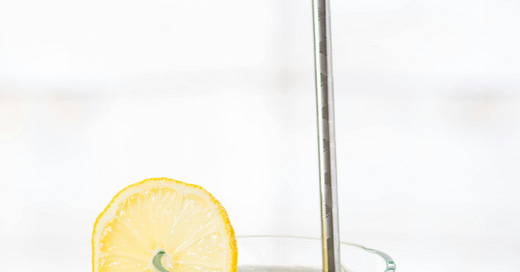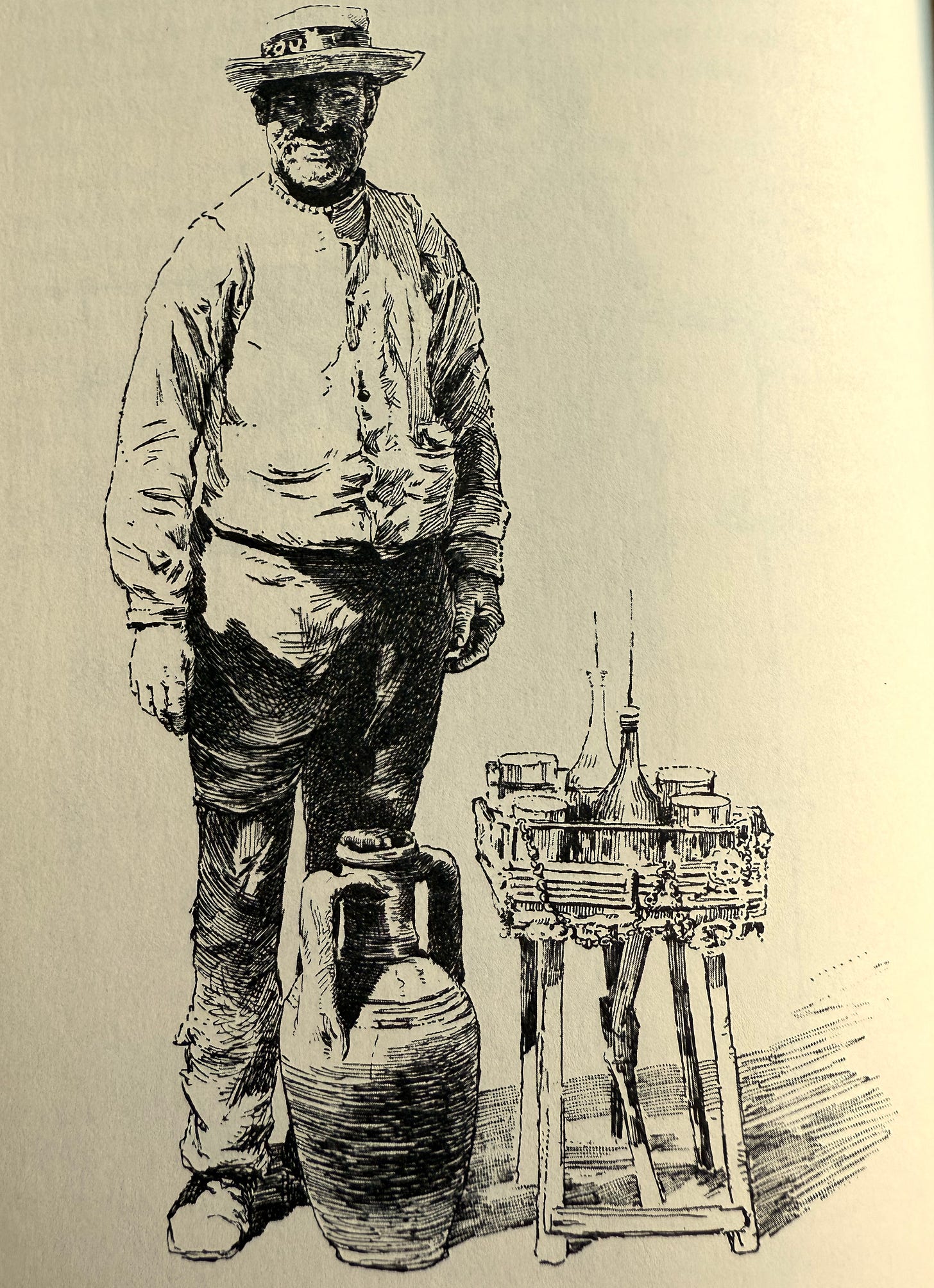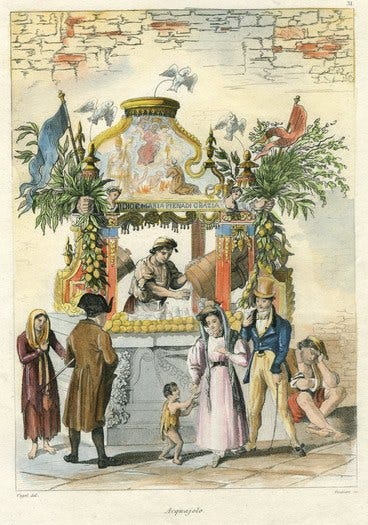Why does lemon make water more refreshing?
A squeeze of lemon in a glass of ice water increases it's thirst-quenching properties A LOT. Here's the story.
In the Bible, there is an episode during Jesus’ crucifixion that often confuses modern readers. Here’s what I mean: in chapter 19 of the book of John, during the last moments of Jesus’ life, he cries out, “I’m thirsty.” An anonymous bystander sees a jar of vinegar, puts a sponge on the end of a stick, soaks the sponge in the vinegar and offers it to Jesus to quench his thirst. This happens in the moment just before Jesus dies.

What on earth is the bystander doing? A sponge of vinegar? Why is there a jar of vinegar just sitting there? What is going on? Well, you have to know a little about ancient beverages to understand.
The authors of the New Testament wrote pretty much exclusively in Greek. In the original text, the Greek word used for the vinegar in the story is oxous (ὄξους). Oxous meant vinegar, but it also meant vinegar mixed with water. Why would that matter? Well, at the time in Roman culture, vinegar-and-water was a common beverage. Romans called this drink posca, and it was drunk by Roman soldiers and the lower classes. Posca was made of a splash of wine vinegar and water, with perhaps a bit of honey to sweeten it. In modern times, it is sometimes called “Roman Gatorade”. The jug of posca was at the crucifixion for the Roman guards to drink, and the bystander would have just been taking mercy on the thirsty Jesus in his last moments by giving him a sip of the soldiers’ stash. Lacking a word for Roman posca in the Greek language, the biblical authors just called it oxous, it was translated as “vinegar”, and that’s how the story is told now.
But why put vinegar in water in the first place? Well, the answer is simple: it makes water more refreshing. The ancients knew that a dash of something sour in water makes the water more satisfying to thirst, and vinegar was the sourest thing available at the time. This tradition continued for thousands of years: in Sicily as late as the 19th century, itinerant water sellers walked the streets offering glasses of water for sale to thirsty passersby. The water-seller would pour a glass of water from his clay jug, and add a dash of vinegar before serving. In this engraving, you can see the bottles of vinegar in the water-seller’s kit.
By the middle ages, when the Islamic philosophy of medicine spread throughout the Mediterranean, sour things like vinegar were thought to be especially healthy. This is probably true- evolutionary biologists speculate that we evolved our taste for sourness because, unlike other animals, we lack the ability to synthesize ascorbic acid (vitamin C) in our bodies. A taste for sourness attracts us to vitamin-rich fruits. Grapes contain vitamin C- as does wine vinegar- so drinkers could get a little bit of vitamin from sipping vinegar-water.
Lemons contain vitamin C too.
The fruits we now know as lemons arrived in the Eastern Mediterranean by 100AD, but they were a curiosity available only to the very rich. Also, they weren’t very sour: the earliest lemons were kind of mealy and bland. But over time, people selected juicy, sour fruits, and eventually tart lemons became the norm. Muslim traders spread the lemon throughout the region, and also invented lemonade- the first mention of the drink was by Isma’ili poet Nasir Khusraw in Cairo about 1000AD. Before long, the entire Mediterranean was putting lemon juice into water- sometimes with sugar, sometimes not- to make it more refreshing, satisfying, and thirst quenching. Lemonade stands became all the rage, from Sicily to Rome to Paris and beyond.
So what causes the perception of sourness? That’s easy: it’s acids. Animals evolved the ability to perceive acids hundreds of millions of years ago (that’s another story), but we describe the sensation of most acids in the mouth with the word “sour”. Today, flavor scientists have confirmed the link between sourness and refreshment. In beverages, sourness amplifies the thirst-quenching properties of water, which makes lemon juice the perfect complement to a cool glass on a hot day. Scientists believe this is because sour flavors make our mouth water. A watery mouth is the polar opposite of a dry, parched mouth, and the mouth-watering property of acids make drinks seem persistently quenching. This phenomenon applies to other beverages too- a “bright” wine (“bright” is a euphemism for acidity in wine) is seen as refreshing, cleansing, and perfect for summer drinking. Lemon makes iced tea better, and citric acid is used in pretty much every soda to make it more sour and thirst-quenching. (Coca-cola uses phosphoric acid for its source of sourness). Kombucha- that fermented beverage craze of the 2000s- is really just vinegar-water: the fermentation process turns sugar in the “tea” into acetic acid, aka vinegar. In Japan, special “drinking vinegars” are marketed as especially delicious, refreshing, and healthful.
In short, a wedge of lemon in a glass of chilled water on a hot day is a welcome garnish from a thoughtful host. Just squeezing the sour lemon in the icy drink is enough to make the mouth water in anticipation of thirst-quenching and refreshment. It’s an act so small that we often miss it- but it’s an example of how our traditions reflect the complex way our bodies understand chemistry, physiology, and health.







Such a great post! When I put a dash of angostura bitters into sparkling water, I find it super refreshing. Do you think that’s just the citrus in the bitters, or is there possibly more going on?